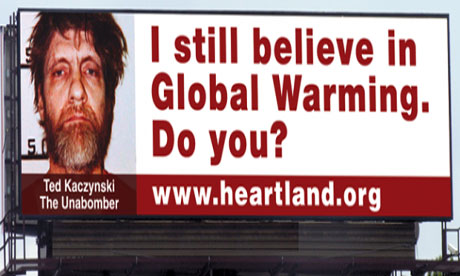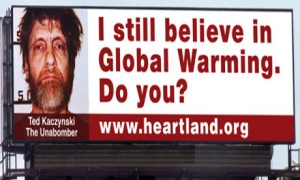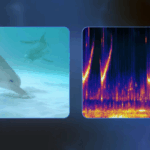If not pay attention because they are about to flood the North American airwaves with disinformation on global warming.
The Heartland Institute released a 1,200 page report last week under the aegis of the NIPCC, the Nongovernmental International Panel on Climate Change. Who are these non-government players?
- The Center for the Study of Carbon Dioxide and Global Change;
- The Science and Environmental Policy Project;
- The Heartland Institute itself.
The report has three lead authors, 50 chapter lead authors, 1,200 pages, and contributors and reviewers from 15 countries. It states that it provides “scientific balance that is missing from the overly alarmists reports of the United Nations’ Intergovernmental Panel on Climate Change.” It claims that the IPCC is selective in its review of climate science. It states that conclusions from IPCC studies are biased and exaggerated, and that the United Nations’ committee ignores key scientific studies. It concludes that CO2 warming predictions are exaggerated and that “any warming that may occur is likely to be modest and cause no net harm to the global environment or to human well-being.”
The NIPCC concludes that:
- Any warming we are observing is “largely driven by variations in solar activity” with the Sun contributing as much as 66% “of observed twentieth century warming, and perhaps more.”
- The warming recently experienced falls “well within the range of natural climate variability” and that includes observed changes to glacial melt and reduced sea-ice cover in the Arctic.
- The climate models used by the IPCC don’t correct for “the non-greenhouse-gas-induced urban heat island effect.”
- That past evidence of greenhouse gas variability reveals the “true inability of carbon dioxide to drive climate change throughout the Holocene.”
- That “global sea-ice cover remains similar in area to that at the start of satellite observations in 1979, with ice shrinkage in the Arctic Ocean since then being offset by growth around Antarctica.”
- That “tropical mountain glaciers in both South America and Africa have retreated in the past 100 years because of reduced precipitation and increased solar radiation.”
- That the relationship between global warming and weather events such as severe drought “is weak” based on historical evidence.
- That rising sea levels “show neither recent acceleration nor any simple relationship with increasing CO2 emissions,” and that the Pacific island nations that are drowning are a result of “direct weather and infrequent high tide events.”
- That extreme weather events being correlated to global warming “seems theoretically unsound” and is “unsupported by empirical evidence.”
Don’t you feel better now? All this worry about climate change and the future are clearly bunk. So who is behind Heartland Institute? Largely funded by Libertarian groups, social and political conservatives, and industry lobbyists such as those behind Big Oil, Big Coal and Big Tobacco, the Institute is decidedly pro-business in its orientation. You can find such illustrious names as the Koch brothers among individual donors, and companies like Exxon Mobil as corporate funders.
The Heartland Institute has questioned the science that links second-hand smoke to health risks. They have launched campaigns that compared climate scientists to terrorists (see image below of Ted Kaczynski, the Unabomber). And they have even attempted to influence curriculum taught to school-age children to promote climate change as a hoax.
The Institute’s multi-million dollar campaign to discredit the IPCC interim report even before its release is rolling out over the next few weeks with speaking events planned for New York City, Boston, St. Louis, Washington, DC, and the State of Florida. Beyond the U.S., the Institute plans for speaking engagements in Germany, the Netherlands and the United Kingdom. Expect to see videos and podcasts supporting their campaign to discredit the IPCC.
What is equally disturbing today is how few companies are following the guidelines of the U.S. Security and Exchange Commission regarding informing investors about the risk of climate change to corporate bottom lines. Today of 3,895 U.S. public companies listed on major stock exchanges, only 27% talk about climate change or global warming in their annual reports. Considering that companies are big users of fossil fuels, the principal source of CO2 emissions, one would think that addressing the issue would be of paramount importance. Even the 1,050 publicly-traded businesses that talk about climate change were weak on specifics with 70% indicating that global warming could affect existing operations, or that environmental regulation on CO2 emissions might affect operations, but not their bottom line.
Interestingly, the energy companies, the corporations most directly affected by climate risk, fail to address its total impact with less than 25% mentioning the impact it could have on assets and operations. Exxon Mobil, the big contributor to the Heartland Institute states in its 2012 annual report that carbon regulation such as a tax or cap and trade would make “our products more expensive, lengthen project implementation times, and reduce demand for hydrocarbons, as well as shift hydrocarbon demand towards relatively lower-carbon sources such as natural gas.” But under market risks in its financial notes there is nary a mention of climate change regulation. And, finally, the company makes no mention of the potential valuation consequences to its proven and recoverable reserves should government legislate carbon limits, effectively keeping discovered carbon-intensive assets in the ground. But of course, how could they when they are part of a team dedicated to disinformation on the climate file?











